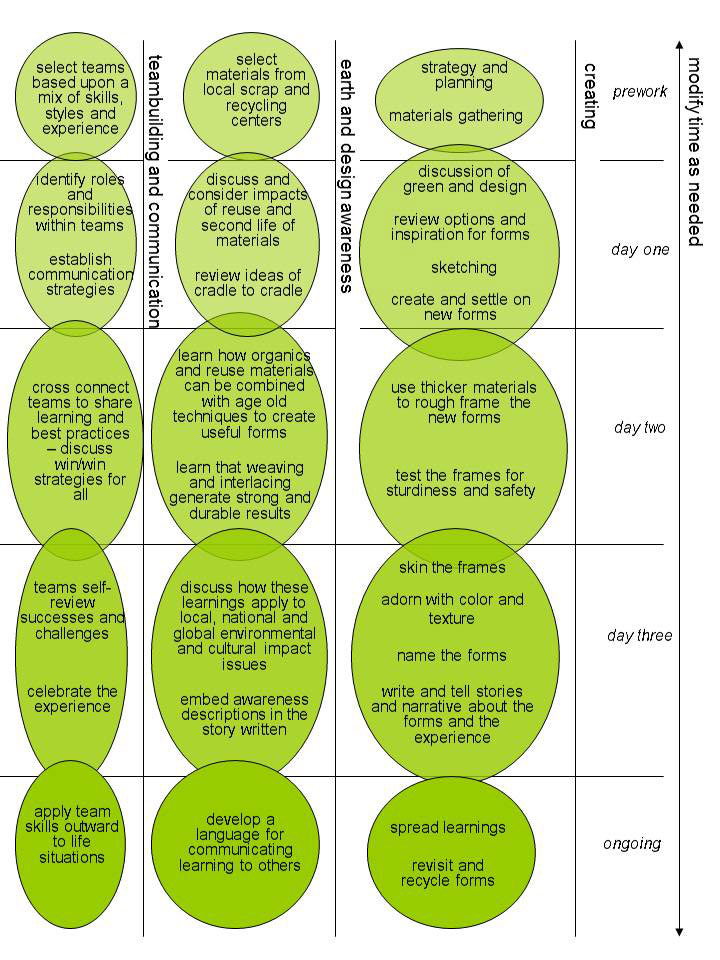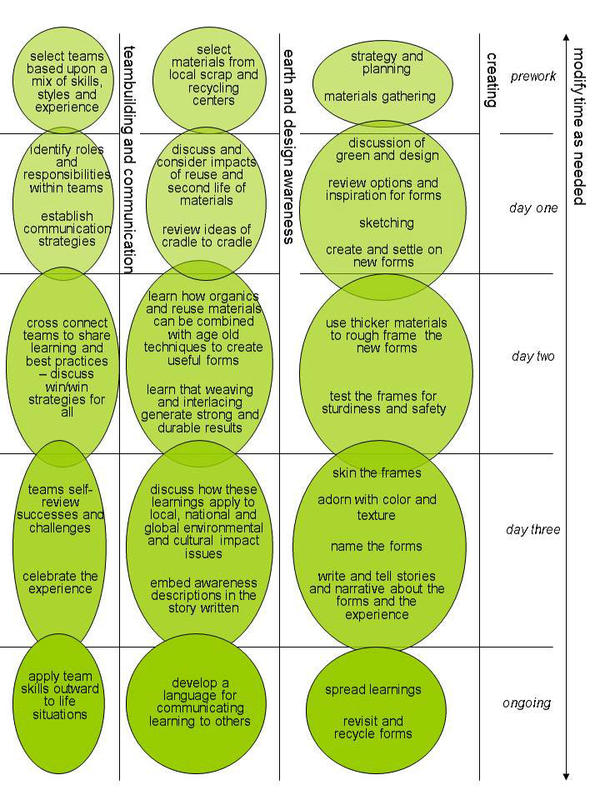Social entrepreneur Owen William Fritts and I get together periodically to discuss visionary approaches to culture, communities, and education.
Through the Earthaware division of his company Solidcore, Owen focuses on awareness building — be it environmental, cultural, or individual. Currently over 10,000 people have experienced his "Flow State" learning process from Haiti to Indonesia, Kashmir to Malaysia, and the U.S. to Japan. Along the way, Owen is charting the benefits of awareness building through Flow State.
Today, in the West, we are highly focused on innovation. We are looking deeply at how the brain works in innovation processes, understanding that integrating simple, repetitive hand / eye tasks into group learning is beneficial. Owen's work reintroduces the tactile to ignite learning and innovation. Below is a recent conversation with Owen exploring his work.

Jody Turner: Owen, with innovation in mind, how do you define Flow State and why is it important to us?
Our position is thus: Flow is a state of mind encountered when one's consciousness is occupied doing a known and repeatable task that has been mastered and requires little to no attention. This condition is also known as Optimal Experience. Many people have experienced this while reading, singing, drawing, or performing sports at a high level. It is when the mind escapes the task at hand, time fades away, and you are so into what you are doing that you forget all else.
We have found that at this ‘Flow’ point, the subconscious is open to learning and absorbing in ways different from traditional teaching and learning methods. We call this Flow State learning. This is partially based upon work by Mihaly Csikszentmihalyi and is currently backed by GGI, a neuroscience think tank dedicated to advance learning by understanding how the brain works.
How involved are your processes? Please give us a picture of what people are experiencing as a build to this flow.
We have developed a simple process that quickly brings participants into Flow State via creative engagement experiences. We teach, or rather help participants “remember,” skills that are inherent to us. We come together in simple workgroups, creating larger scaled objects through the weaving of local, found materials. The weaving is so simple to do that it is mastered within minutes, establishing the first tenant of Flow: mastery of activity.
With young people, we make animal shapes sometimes as large as a hippo. With teens, youth, and adults, we usually make shelter forms – connecting them together to create villages. Creating larger objects requires teaming up; in this way, the learning becomes collective. Spontaneous conversation, and often song, naturally erupts.
Once the participants are active in weaving the materials together, making the desired forms, we introduce subject matter. Truly any topic can be introduced. Through story telling we focus on the dynamic topics of environmental awareness, personal and team character building, and cultural community engagement. The participants are encouraged to follow their own course of discussion and idea generation on the topic WHILE ALSO weaving forms — doing both at once. They self-guide the conversations while mindlessly weaving and creating. As guides, we monitor and stop them occasionally, asking them to write or draw out what they have been discussing. This is the point, usually after several stops and starts, where innovative ideas emerge. We softly guide them so they stay on topic yet allow enough space for the incubation and emergence of unique ideas and experiences not previously brought up or connected in such a way.
Workshops range in time from three hours to five days, depending on the audience, funding groups, and curriculum desired. Results and effectiveness are typically proportional to the time invested.
What is your intention with this style of teaching you are developing?
Our intention at Earthaware is to raise awareness of consumption models that affect the environment. Through the Flow State workshops, we want participants to find ideas that positively affect the balance between humans and the planet and to do it in locally relevant applications.
How is this flow process different from other innovation or learning processes?
Traditionally, and certainly in most school systems that we have encountered, the majority of learning is done while sitting and listening to an instructor or reading content that has been prepared in order to lead to a specific, defined result. Traditional learning styles have their place and have proven success worldwide. Our methods use activity, creativity and differing brain mechanics. Flow State learning is intended to be in addition to and in support of traditional methods.
The same goes for programs with corporations where the group tactile learning elements and innovation sparks are directed to desired corporate outcomes. These can be in the form of Earthaware visiting a corporate campus and running workshops or meeting teams at remote retreat sites for the work.
What are some of the inspiring experiences from your work?
For over three years, we have been running Earthaware programs around the world. There are so many amazing experiences and bright-eyed participants that selecting just a few is difficult. Here are a few — each different yet incredibly similar in experiences and outcomes. This amazes me the most. I have done this process across the world with different age groups, cultures, and classes, and I find that we are more alike than we may think when it comes to working together for a creative outcome. Here are a few of our projects and shares around this.
–InnoKidz, Singapore – As a founding team member and curriculum contributor to non-profit InnoKIDZ, we created an after school and camp-based program using the Earthaware Flow State Teaching model as the framework. The most recent InnoKIDZ project was run for 160 16-17-year old street kids and escapees from human trafficking at the Montfort Boys Town in Kuala Lumpur.
-Haiti Hands, Port Au Prince, Haiti – On the one-year anniversary of the devastating Haitian earthquake, we ran a week-long public workshop backed by Nike. We brought over 1,200 people, mostly youth, out of the temporary tarp cities to collectively build a memory wall sculpture using the Earthaware weaving methods. During the building process, cultural methods of assemblage, old work songs, and a rainbow of stories were evoked and a degree of healing was found.
-Arabs+Israelis as One, Hand and Hand School, Jerusalem, Israel – Early on, we were known as OpenMotion, which became Earthaware in late 2010. We ran a three-day program for Hand and Hand, an amazing school that teaches children from traditionally opposite interests, side by side. We used local materials to collectively make numerous useful items from shade structures to group swings to soccer goals.
-Blue Camp, Bintan and Riau Archipelago, Indonesia – We have taught numerous programs on this island chain in western Indonesia since first being invited by NGO, The Island Foundation. This has developed into a standing quarterly experience for locals from multitude of villages and islands. Through sequential building experiences we teach about the ocean and our human connection to it.
-RavineBabies, Tong Len Encampment, Lower Dharamsala, India – Perhaps the most difficult project we performed was with over 75 little ones living as refugees at the foothills of the Himalayas, displaced by drought in Rajasthan. Complete lack of healthcare, sanitary facilities, education, or nutritious food has left these souls and 400+ adults in desperate condition. Despite these circumstances the creative nature and curiosity of these angels was in effect from the moment the team ventured in to teach toy making from found trash.
Who are your current partners in these endeavors?
Our work has activated numerous partnerships and co-beneficial relationships. The Earthaware programs are a natural fit as an enhancement to many existing programs offered by educational and environment oriented organizations be they non-profit, NGO, or corporate. Our current partners are SCRAP, The Island Foundation, Bali Green School, Tibetan Children’s Villages, Architecture for Humanity, Cause No Harm, Full Circle Initiative, GGI, Nike Foundation, YUWA, A+D Museum Los Angeles, and HOLA.
Lastly, I see brands really benefitting from this process. What are your thoughts on this?
Surprisingly, this technique has great bearing upon brands. Brand success always comes from meeting clientele needs where they are going, not where they have been. Earthaware delivers a new educational model that opens up potentials and possibilities for learning and innovative thinking while delivering intended awareness. In order to maintain leadership, capturing and employing strategies that lead to innovation, such as Flow State learning, can only help brands secure the market positions they desire.
Thank you, Owen!
Thank you, Jody!
##
Jody Turner is founder of Culture of Future, an innovation strategy and marketplace consultancy providing strategic insights. Jody also works with trendwatching.com, London whose insights go to 200,000+ in over 180 countries and 9 languages. Client projects have included insights for Apple, BMW, P&G, Dell, The Gap, Unilever of Istanbul and multiple others. Jody is on the Board of Directors for the Detroit Empowerment Plan, a group that recently received the JFK Library Foundation Award, and is on the Board of Advisers for the Los Angeles A+D Museum.
Owen William Fritts, founder of SOLIDCORE and its Earthaware educational division, runs programs for kids and adults teaching greater awareness of the human/planet relationship using found materials, creativity and a unique Flow State learning process. He speaks globally on environment and design at conferences, schools and for corporations. Previously Owen ran corporate architecture and design firms with clients Nike, Microsoft, Disney, Gap, Vitra and more. He currently serves on the Board of Directors at SCRAP and chairs the Board of Advisers at the Los Angeles A+D Museum.








